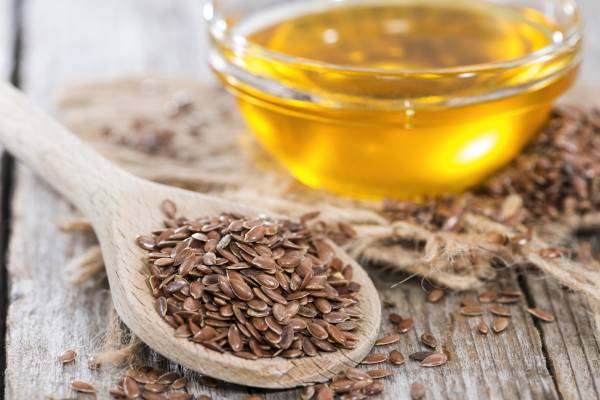I’m sure you’ve heard plenty about both flax seed oil and fish oil. Some people swear by one or both. If you read enough claims on the Internet, you’d think these supplements could cure every disease plus have dinner ready for you when you get home.
Let’s take a brief look at what the actual research says about the health benefits of these supplements. We will also go over what the difference is between fish and flax, and if you should be taking either one.
Fish oil (left) and flax seed oil (right) are both known for their health benefits.
Fish Oil
Omega 3 fatty acids are the primary reason you would take a flax or fish supplement. Specifically, EPA and DHA are required in our diet because the body cannot manufacture them. If we are deficient in these fatty acids, there are neurological, cardiovascular, and skin complications that can develop, among other things. There isn’t a set number for recommended intake of DHA and EPA, but we do know that certain populations can be at risk. These people include vegetarians, pregnant women, people avoiding fat, and those with compromised digestion.
“My guess is that the people who benefit the most from supplementation are those who have a low intake of omega 3s to begin with.”
Fish oil has been studied extensively for cardiovascular benefits. In a large review of fish oil supplementation, researchers found no benefit of supplementation for people with a history of cardiovascular disease. However, studies such as one done by Mozaffarian et al showed that higher amounts of circulating DHA and EPA were associated with less risk of mortality from cardiovascular events in subjects not taking supplements. That simply means they got the omega 3 acids from whole food sources. Of course, the science isn’t perfect, but people around the globe who live a long healthy life tend to eat seafood. The Mediterranean diet, for example, is rich in omega 3s.
Other ailments, such as arthritis and dry eye, do show promise with fish oil supplementation. A book could be written about specific situations and desired results with fish oil, but the point I am trying to make is that with regular fish consumption (one to three times a week), your overall omega 3 status should be fine for general health. My guess is that the people who benefit the most from supplementation are those who have a low intake of omega 3s to begin with.
Flax Seed
Flax seed oil has many supporters, although it is less studied than fish oil. Like fish supplements, flax oil has shown promise with cardiovascular disease, brain function, dry eye, cancer, recovery, and just about anything else you can think of.
“Overall, there is no evidence available today that can clearly define a therapeutic use for flax seed oil.”
But most of the hype is from small studies with various issues or from anecdotal evidence. For example, Paschos et al showed that 8g a day of flax oil lowered blood pressure in men. But the study involved only 59 people, examined only men, and was only twelve weeks. Promising results, but not enough to think of flax oil as a treatment for hypertension. Overall, there is no evidence available today that can clearly define a therapeutic use for flax seed oil.

The Difference
While both oils are consumed for their omega 3 fatty acids, the amount and type you’re getting can vary. Fish oil contains DHA and EPA directly. Look at the label on a bottle of fish oil and you will usually see the amount of DHA and EPA contained per serving. An example would be a 1,200mg pill containing 180mg EPA and 120mg DHA. Your body can use this as is.
“To get the equivalent of one fish oil pill, you would need to take fifteen to twenty flax pills.”
In flax seed oil, the main omega 3 is ALA. Your body needs to convert ALA to DHA and EPA. It is estimated that your body can convert only 5-10% of ALA to EPA and 2-5% to DHA. In other words, you need a large intake of flax seed to convert it to other essential fatty acids, and it is a poor choice for EPA and DHA requirements.
So, assuming your body is efficient at converting ALA, taking 1,200mg of flax oil will yield 12mg of EPA and 6mg of DHA. To get the equivalent of one fish oil pill, you would need to take fifteen to twenty flax pills.
A Better Way
I believe in whole foods for nutrition versus supplements whenever possible. Flax seeds do have benefits. As opposed to just the oil, ground flaxseeds have fiber and compounds called lignans. Lignans have shown some promise, albeit in animals and test tubes, of being beneficial for cancer prevention.
“Spending your money on the entire food provides calories and a wide array of nutrients that oils cannot.”
Fish not only have the omega 3 content, but are also full of protein, B vitamins, iodine, selenium, vitamin D, and plenty more vitamins and minerals depending on the species. By eating fish and ground flax, you are putting your health in nature’s hands, as opposed to chasing potential benefits with one part of the food.
And let’s not forget money, because supplements are expensive. Spending your money on the entire food provides calories and a wide array of nutrients that oils cannot.

Take Home
- We do not have a full body of quality evidence when it comes to the benefits of supplement forms of fish and flax oils. So, whole foods remain your the best choice.
- Eat a variety of fish once or twice a week. Go with what’s on sale each week and look up new recipes.
- Ground flax is preferred to the whole seed, because your body cannot digest the seed by itself.
- Try including one to three tablespoons of ground flax in a shake, yogurt, or salad.
- Consult a qualified nutritionist if you feel you may be deficient in omega 3s due to dietary restrictions or health issues. There are other sources for these fats, such as algae and seaweed.
Supplements are okay if you want to experiment with a specific case. For example, people swear by flax oil for dry eyes or fish oil for recovery on a tough program. The side effects are minimal, so it can be a cheap experiment to see if it works for your specific case. A doctor may also prescribe high dose fish oil for triglyceride lowering. Again, it depends on the case, but for general health you can probably do without supplements.
More Like This:
- The 3 Tools I Used to Conquer Autoimmune Disorder
- 4 Easy Tips for a Happy, Healthy Brain
- Six Easy Ways to Enhance Your Brain Health
- New on Breaking Muscle Today
References:
1. Austria, J. Alejandro, Melanie N. Richard, Mirna N. Chahine, Andrea L. Edel, Linda J. Malcolmson, Chantal M.c. Dupasquier, and Grant N. Pierce. “Bioavailability of Alpha-Linolenic Acid in Subjects after Ingestion of Three Different Forms of Flaxseed.” Journal of the American College of Nutrition 27, no. 2 (2008): 214-21.
2. Davis, Brenda C, and Penny Kris-Etherton. “Achieving Optimal Essential Fatty Acid Status in Vegetarians: Current Knowledge and Practical Implications1,2,3.” The American Journal of Clinical Nutrition 78, no. 3 (2003): 6405-465.
3. Giuseppe, D. Di, A. Wallin, M. Bottai, J. Askling, and A. Wolk. “Long-term Intake of Dietary Long-chain N-3 Polyunsaturated Fatty Acids and Risk of Rheumatoid Arthritis: A Prospective Cohort Study of Women.” Annals of the Rheumatic Diseases 73, no. 11 (2013): 1949-953.
4. Mozaffarian, Dariush, Rozenn N. Lemaitre, Irena B. King, Xiaoling Song, Hongyan Huang, Frank M. Sacks, Eric B. Rimm, Molin Wang, and David S. Siscovick. “Plasma Phospholipid Long-Chain ω-3 Fatty Acids and Total and Cause-Specific Mortality in Older Adults.” Annals of Internal Medicine Ann Intern Med 158, no. 7 (2013): 515.
5. Myung, Seung-Kwon. “Efficacy of Omega-3 Fatty Acid Supplements (Eicosapentaenoic Acid and Docosahexaenoic Acid) in the Secondary Prevention of Cardiovascular Disease.” Archives of Internal Medicine Arch Intern Med 172, no. 9 (2012): 686.
6. Paschos, G K, F. Magkos, D B Panagiotakos, V. Votteas, and A. Zampelas. “Dietary Supplementation with Flaxseed Oil Lowers Blood Pressure in Dyslipidaemic Patients.” Eur J Clin Nutr European Journal of Clinical Nutrition 61, no. 10 (2007): 1201-206.
7. Pinheiro, MN, and PM Dos Santos. “Oral Flaxseed Oil (Linum Usitatissimum) in the Treatment for Dry-eye Sjögren’s Syndrome Patients.” Arq Bras Oftalmol 70, no. 4 (2007): 649-55.
Photos courtesy of Shutterstock.






